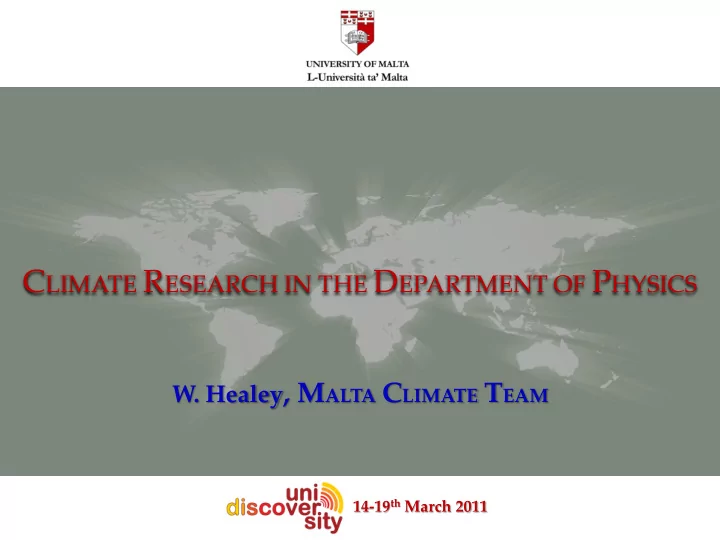

C LIMATE R ESEARCH IN THE D EPARTMENT OF P HYSICS W. Healey , M ALTA C LIMATE T EAM 14-19 th March 2011
Evaluating the Land Surface Model of the Regional Climate Model PRECIS
• Why the climate? -The weather patterns over a period of years. -The Impact of the climate. • How do we do it?! -Computer models running simulations of parameters -Different scales: Global, Regional and Local
300 km 50km • How do we do it?! 250 m -Computer models running simulations of parameters -Different scales: Global, Regional and Local 2
The effect of the surface on climate… 3
The effect of the surface on climate… 3
… in the climate model Clouds Radiation LSM Dynamic Core Aerosols 4
P roviding RE gional C limates for I mpact S tudies (PRECIS) 5
P roviding RE gional C limates for I mpact S tudies (PRECIS) 5
The details • A 60 year study from 1960 till 2020 • Taking parameters most affected by the land surface – temperatures and moisture levels • Comparing the LSMs with Measured Data 6
M et O ffice S urface E xchange S cheme – the LSM 9 different surface types: Broadleaf trees, needleleaf trees, temperate grass, tropical grass, shrubs, bare soil, Ice, Urban and lake/inland water Upgrades over the older version include: • Height of vegetation in calculations • Shortwave / longwave radiation • Soil flooding 7
Results part I MOSES 2.2 MOSES 1 Average surface temperature from 1960 to 1990 Measured 8
Results part II Surface temperature Temperature ( ˚C) Time (Years) 9
Results part III Relative Humidity Relative Humidity (%) Time (Years) 10
Conclusions • PRECIS is still relatively weak in predicting the measured results. • Spatial plots reveal an over prediction in tropical regions and an under prediction in temperate regions. • Time series for surface temperature shows on average an over prediction of about 0.3 ˚C in models. • Whilst an under prediction of around 3% for relative humidity. • MOSES2.2 results do not show improvement in PRECIS’ performance compared to measured data. 11
Thank you! 11
Recommend
More recommend